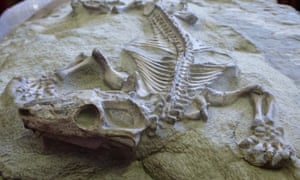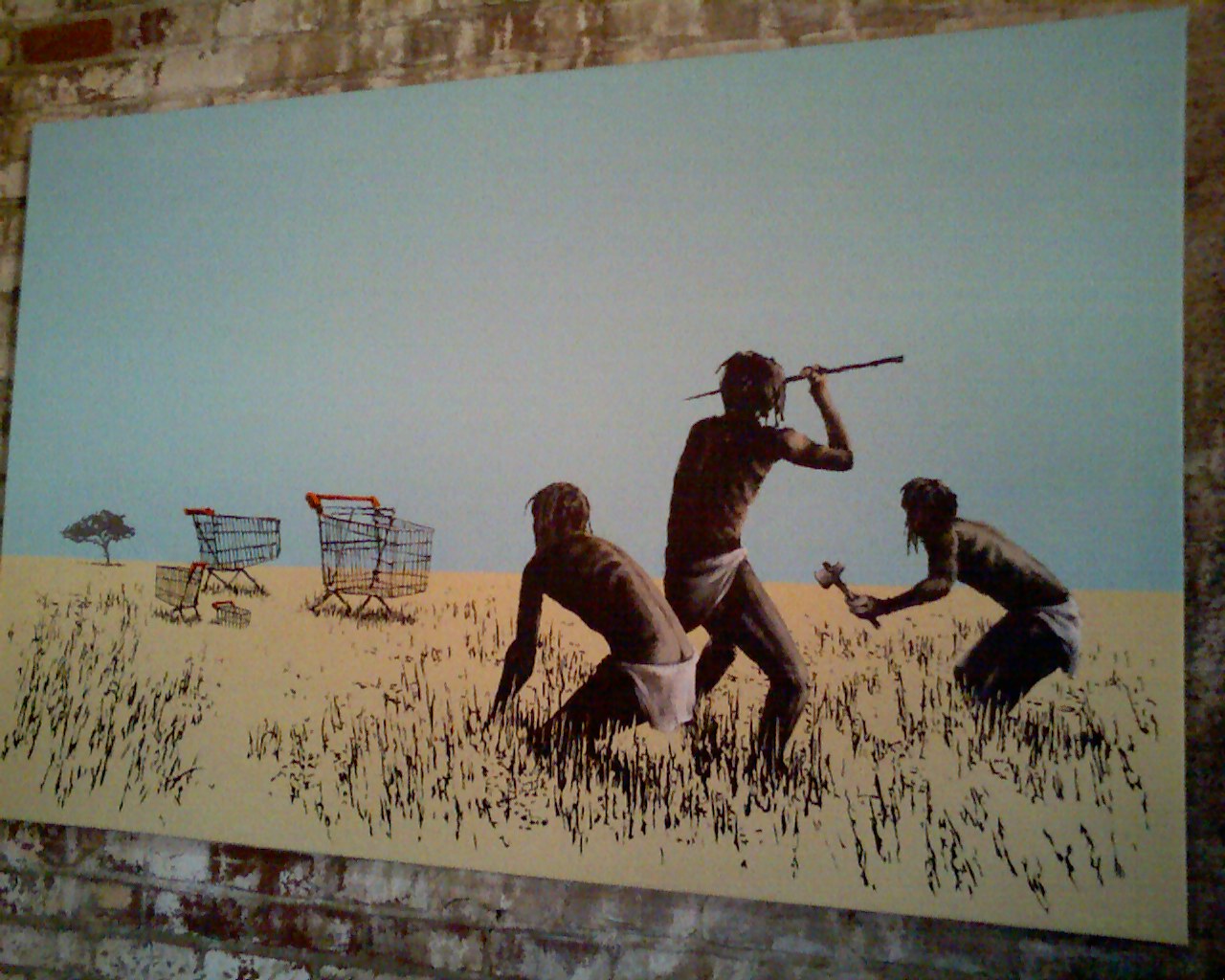via the Guardian by Dana Nuccitelli
New geological research from Utah suggests the end-Permian extinction was mainly caused by burning coal, ignited by magma

Fossil of a Galesaurus, a cynodont that lived during the Permian period. Photograph: Iziko Museum of Natural History
Earth has so far gone through five mass extinction events – scientists are worried we’re on course to trigger a sixth – and the deadliest one happened 252 million years ago at the end of the Permian geologic period. In this event, coined “the Great Dying,” over 90% of marine species and 70% of terrestrial vertebrate species went extinct. It took about 10 million years for life on Earth to recover from this catastrophic event.
Continue reading
==============================
via the Big Think blog by Ali Alizadeh
One need not be a parent of a young child, as I am, to be conscious of the full-blown resurgence of the superhero in contemporary popular culture. Beyond the dizzying proliferation of fetishised merchandise to do with Marvel and DC protagonists and the frankly obscene sights of middle-aged folk squeezed into uncomplaining lycra and leotards at Comic-Con gatherings, one may sense the spectral presence of the hero, that crucial cultural figure which has beguiled humanity since the epics of Homer and the demigods of ancient mythology. Yet there is more to the hero than a fanciful tale of courage and exceptional strength.
Continue reading
==============================
via Boing Boing by Mark Frauenfelder
It has no teeth, a 2-foot long tongue, and a stick-like head. The giant anteater has lived on earth for 25 million years. But because of over-hunting, its existence is being threatened.
Man is responsible for the destruction of so much, so many!
==============================
via Interesting Literature
A commentary on one of the most famous war poems
‘Dulce et Decorum Est’ or, to give the phrase in full: Dulce et decorum est pro patria mori, Latin for ‘it is sweet and fitting to die for one’s country’ (patria is where we get our word ‘patriotic’ from). The phrase originated in the Roman poet Horace, but in ‘Dulce et Decorum Est’, Wilfred Owen (1893-1918) famously rejects this idea. For Owen, who had experienced the horrors of trench warfare and a gas attack, there was nothing sweet, and nothing fitting, about giving one’s life for one’s country. Focusing in particular on one moment in the First World War, when Owen and his platoon are attacked with poison gas, ‘Dulce et Decorum Est’ is a studied analysis of suffering and perhaps the most famous anti-war poem ever written.
Continue reading
==============================
via 3 Quarks Daily: Ted Nordhaus in The Breakthrough
The winemaking facilities at Paolo Bea are not what you might expect.
Giampaolo Bea’s family has made wine in the region for almost 500 years. He is one of the founders of Italy’s natural wine movement and evangelizes his craft, claiming to make wines that represent as pure an expression as possible of the fruit of the vine, with as little human intervention as possible. No synthetic pesticides or fertilizers are used in the vineyard. No chemicals are added during fermentation. He makes wines of exceptional freshness, and his wines have garnered a cult following among natural wine lovers around the world.
Continue reading
==============================
via Eurozine by Davis Graeber and David Wengrow

Art work by Banksy (title unknown). Source: Flickr
1. In the beginning was the word
For centuries, we have been telling ourselves a simple story about the origins of social inequality. For most of their history, humans lived in tiny egalitarian bands of hunter-gatherers. Then came farming, which brought with it private property, and then the rise of cities which meant the emergence of civilization properly speaking. Civilization meant many bad things (wars, taxes, bureaucracy, patriarchy, slavery…) but also made possible written literature, science, philosophy, and most other great human achievements.
Almost everyone knows this story in its broadest outlines. Since at least the days of Jean-Jacques Rousseau, it has framed what we think the overall shape and direction of human history to be. This is important because the narrative also defines our sense of political possibility. Most see civilization, hence inequality, as a tragic necessity. Some dream of returning to a past utopia, of finding an industrial equivalent to ‘primitive communism’, or even, in extreme cases, of destroying everything, and going back to being foragers again. But no one challenges the basic structure of the story.
There is a fundamental problem with this narrative.
It isn’t true.
Continue reading (be warned it’s a long one)
==============================
via Boing Boing by Andrea James

People who need custom furniture in the future may be able to feed the design into a program and then have robot-assisted carpentry do the rest.
Continue reading (and watching)
==============================
via the Big Think blog by Anne Trafton
The scientists have traced the signals to just 180 million years after the Big Bang, making the detection the earliest evidence of hydrogen yet observed.
Continue reading
==============================
via the Guardian by Emine Saner
Doctors have warned that overuse of electronic screens is leaving some children unable to hold a pen properly. But while learning as an adult is difficult, it’s not impossible

‘After age 11, you can learn things – but you have to really want to.’ Photograph: PhotoAlto/Michele Constantini/Getty Images/PhotoAlto
This week, paediatric occupational therapists warned that children were entering primary school not knowing how to hold pens and pencils, owing to an overuse of technology instead of activities that build muscles in the hands and teach control of movement, such as using building blocks. But what if you make it to adulthood without knowing how to hold a pen? Can you learn then? “You can, but the brain of a very young child is so plastic that it just absorbs information quite well,” says Angela Webb, recently retired clinical psychologist and the chair of the National Handwriting Association. “After age 11, you can learn things – but you have to really want to, you have to be motivated, you have to practise. The ideal position is if you learn in early childhood and then you have a skill for life.”
Continue reading
==============================
via Interesting Literature
What is the meaning of this curious Blake poem?
Is it always best to tell someone you have feelings for them? Is it sometimes better to withhold your true feelings, and not confess your love? Obviously this depends, but this underappreciated short poem by William Blake explains why sometimes it’s better to have loved and kept quiet than to have blabbed about the depth of your affections.
Continue reading
No comments:
Post a Comment